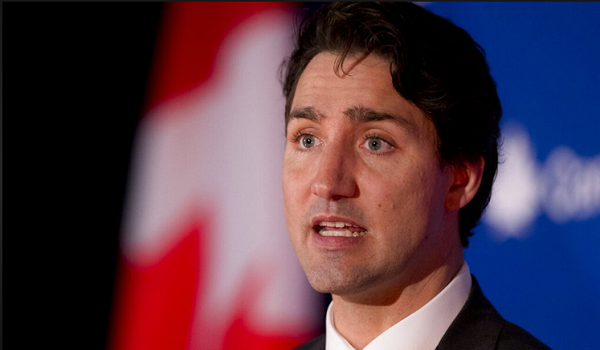Trudeau has a $1B border plan designed to counter Trump’s tariff threat, insider says
As Prime Minister Justin Trudeau delivers a $1-billion border-security package to counter president-elect Donald Trump’s threatened 25 per cent tariffs, Premier Doug Ford says Canada must be ready to strike back.
The Ontario premier warned Tuesday “if it’s appropriate, then we will retaliate” with matching tariffs on American products.
Canada’s first ministers meet virtually at 4 p.m. Wednesday to discuss the incoming U.S. president’s plan to slap 25 per cent import duties on all Canadian and Mexican goods unless America’s neighbours curb illegal immigration and fentanyl smuggling.
A senior federal official said Trudeau and two of his senior cabinet ministers would be seeking premiers’ feedback on Ottawa’s plans.
The insider, speaking confidentially in order to discuss internal deliberations, said the prime minister will outline measures to beef up border security that will cost more than $1 billion.
As well, Trudeau will expand on a list of potential retaliatory levies on American products being prepared by the finance department.
“Hopefully we’ll never go down that road. It’s not worth it,” said Ford, who chairs the 13 provincial and territorial premiers’ Council of the Federation.
”(But) we’re going to work hand-in-hand with them — all the premiers — and it’s going to be a Team Canada approach,” he stressed.
The prime minister’s goal, according to the federal official, is the same: to prevent U.S. tariffs from being imposed and to demonstrate to Trump and his team that what Canada is doing and will do on the border resolves his concerns about illegal migrants and drug smuggling.
Deputy Prime Minister Chrystia Freeland and Public Safety Minister Dominic LeBlanc, who is also intergovernmental affairs minister, will participate in the call.
Freeland noted Tuesday that in previous North American free trade pact negotiations with Trump in 2018, “we did not escalate and … we also did not back down.”
”The prime minister was clear yesterday. He said that of course Canada would respond to unjustified tariffs,” Freeland told reporters in Ottawa.
“Our focus is on achieving a win-win outcome. Our focus is on explaining to our American partners, our American neighbours that the trading relationship with Canada is balanced and mutually beneficial,” she said.
“It’s a special relationship because Canada is the largest market for the U.S. We are a bigger export market for the U.S. than China, Japan, the U.K. and France combined. That puts us in a special position and of course Canada supplies to the United States things America absolutely critically needs — oil, electricity, uranium, critical minerals and metals.”
Six years ago, Trump slapped 10 per cent tariffs on Canadian steel and aluminum products, claiming supposed national security risks, which triggered Canada’s retaliation with $16.6 billion in matching dollar-for-dollar tariffs on a range of American imports.
After that brief trade war, tariffs were eventually dropped on both sides.
Ford, meanwhile, downplayed Trump’s pre-dawn social media post, which had some Canadians atwitter, describing Trudeau as the “Governor” of the “Great State of Canada.”
“That’s the president’s words. I can tell the president, I’m sure not thinking of Justin Trudeau at midnight. So if he’s thinking of Justin at midnight, it’s probably a good relationship,” he said with a shrug.
But the premier pointedly said Trump “should be worrying about China, he should be worrying about North Korea and Iran and all the other countries out there — that’s a much bigger threat than Canada.”
On Monday in Halifax, Trudeau said “we know a few things about Donald Trump,” including that he means what he says when he threatens tariffs and that “his approach will often be to challenge people, to destabilize a negotiating partner, to offer uncertainty and even sometimes a bit of chaos into the well-established hallways of democracies and institutions.”
“And one of the most important things for us to do is not to freak out, not to panic,” the prime minister said.
“Knowing that, yes, these (tariffs) would be absolutely devastating means we have to take them seriously, but it does mean we have to be thoughtful and strategic and not go around making our opponent’s arguments for him, but making our arguments in a significant and united way,” he said.
The senior federal official said Trudeau would continue to appeal for a united front among Canadian political leaders.
Ford said the premiers are eager to hear Trudeau‘s plan for alleviating Trump’s border concerns.
“They said they were going to come back with a plan to put together a proposal … to strengthen our borders and hopefully meet our two per cent NATO commitment and to come up with a plan for negotiations with the U.S. on the trade.”
Wednesday’s meeting is the second the first ministers have held since the president-elect’s Nov. 25 social-media attack on Canada and Mexico, vowing new tariffs on the day he is inaugurated Jan. 20, unless America’s neighbours boost border security. They also met virtually on Nov. 27.
Next Monday, Ford is gathering the premiers in person in Toronto to discuss the crisis.
LeBlanc, who was with Trudeau at a Nov. 29 dinner with Trump at his Florida resort, Mar-a-Lago, has promised “additional investments to reassure Canadians that all of the measures necessary are in place and will continue to be in place” at the border.
He has indicated that will mean more resources — helicopters, surveillance drones and manpower — for the Canada Border Security Agency and the RCMP.
This article was first reported by The Star













